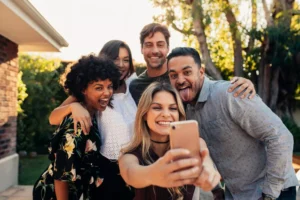Judging by the photos on their Instagram account, you would think that travel bloggers Jarryd and Alesha of Nomadasaurus live a charmed life. But recently they came clean, admitting that behind their brilliant smiles displayed in pictures of exotic places across Asia, lies a strained relationship, badly in need of repair. It was refreshing authenticity on a medium that only tends to display the positive, the impressive.
The article got me thinking about why we tend to be less-than-genuine on social media. Here are three reasons I think we don’t tell the whole story online:
Validation. Many have written about how social media promotes narcissism. With an Instagram, YouTube or Facebook account, an ordinary individual is given a stage. The temptation is to be a character on that stage rather than your actual (flawed) self. A desire to be liked, to seem impressive and be recognized as valuable can tempt us to exaggerate our experiences or always paint them in a positive light (for example, with a patently self-flattering “Facebrag”). But for every “Facebrag,” there are usually ten more depressing things that have happened to us that day.
Celebration. I don’t know about you, but many times my social media interactions are inspired when something good happens. Maybe I just found out I’m going to a concert or I witness a beautiful sunset. I’m experiencing something good, and I want others to experience it with me. On the flip side, I almost never feel inspired to tweet about my two-hour wait at the DMV, the five pounds I’ve gained over the holidays or the fact that I’ve just had an argument with my husband.
A perfect example is this picture, which I posted last week as we were settling into our new house. Feeling proud that we had made one room look livable, I posted “Beginning to look like home” and thanked some people who had helped us unload our truck the night before.

Cropped in like that, the photo did not present the full story, which is depicted in the second photo below. However, the more truthful photo didn’t convey the celebratory feeling I wanted to share.

Inspiration. A few years ago, I wrote a post called “Facebook Wars,” where I talked about how posting to social media provided me with a sense of accomplishment. Posts about my accomplishments are like saying, “Hey, look, I did something worthwhile today.” The idea behind posts that broadcast how far you ran that day or show the gourmet meal you prepared may be to provide yourself with a sense of accomplishment and inspiration to continue down a good path.
These are three of the reasons I think we put on a happy face for social media. But many times, like with Jarryd and Alesha, things aren’t as picture perfect as they appear. Several years ago, this article talked about why Facebook makes us sad. Essentially, when we see other people’s online “happiness,” we assume we are alone in our unhappiness. I can feel like I’m the only one not taking exciting trips, working a fulfilling job, dating or hanging out with friends.
While we may not be intentionally “faking it” online by posting only the good, admitting to a failure or disappointment now and then could go far to help others realize they are not alone. In addition, don’t assume that just because a friend is posting smile-filled selfies, everything is going great. Someone putting up a good front online may be dealing with a lot of hidden pain. Interact with people offline to find out how they’re actually doing. A picture may be worth a thousand words, but clearly social media doesn’t tell the whole story.










